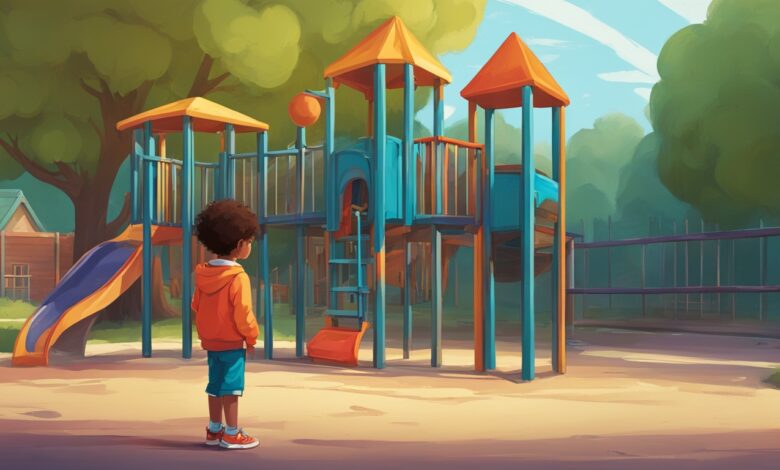
Have you ever felt your heart sink during a family event? You see the laughter of younger siblings, but the oldest child seems invisible. This feeling is common in many families. Many older kids feel ignored, leading to deep emotional issues.
They often try hard to get attention while handling big responsibilities. This article will look into how older kids feel in busy families. We’ll see how they deal with being overlooked and what they need from their parents.
Create an image of an older child sitting alone at a dinner table while the rest of the family is engaged in conversation. The child looks sad and isolated, with their head down and their body language closed off. The family members are all turned towards each other, laughing and talking, their backs to the lonely child. The room is dimly lit and the atmosphere feels cold and distant.
Key Takeaways
- Older children often feel neglected in families with multiple siblings.
- This neglect can significantly impact their self-esteem and emotional well-being.
- Families where the oldest child feels overlooked may experience increased sibling rivalry.
- Parental efforts to engage one-on-one can strengthen relationships with the oldest child.
- Simple acts of praise and shared activities effectively combat feelings of being ignored.
The Impact of Parental Neglect on the Older Child
Parental neglect can affect older children in many ways, making them feel invisible. They might think they need less attention than their younger siblings. Emotional neglect is often overlooked, leading to big problems for these children.
Understanding how emotional neglect affects older kids is crucial. It can deeply impact their mental health and relationships. Neglect can make it hard for them to show their feelings.
Understanding Emotional Neglect
Emotional neglect means not getting enough love or support. This can really affect older kids. They might feel they’re not worth much and become lonely.
This can make it hard for them to make good friends. Neglect can also affect their mental health and how they handle their feelings.
The Effects of Lack of Attention
Older kids without enough attention face many problems. The lack of attention can cause:
- Decreased self-esteem
- Increased aggression or anger
- Early involvement in substance misuse
- Isolation from peers
- Early sexual activity
- Difficulty in academic settings
- Depression or self-harming tendencies
The effects of neglect can be subtle but harmful. When parents ignore their older kids, they miss out on love and support. This can lead to ongoing emotional issues.
Recognizing Signs of Overlooked Older Children
It’s important to spot the signs of neglect in older kids. Look out for these signs:
| Sign | Description |
|---|---|
| Withdrawal | Reduced social interactions with peers and family |
| Behavioral Issues | Displays of aggression or sudden changes in behavior |
| Declining Academic Performance | Loss of interest in schoolwork and decrease in grades |
| Emotional Distress | Heightened anxiety or symptoms of depression |
| Substance Misuse | Experimentation or regular use of drugs or alcohol |
Seeing these signs of overlooked older children helps parents and caregivers act. It’s key to stop emotional neglect early and give kids the support they need.
Middle Child Syndrome: A Comparison
Middle Child Syndrome shows the special challenges middle children face. They often get less attention than their older and younger siblings. This makes their emotional journey in the family unique.
What is Middle Child Syndrome?
Middle Child Syndrome is about the hidden struggles middle children have. They might feel left out, especially when firstborns get lots of attention. And the youngest get special treatment as the “baby.”
This leaves middle children feeling ignored or like they’re not noticed. They might even be seen as “assholes” or have their true selves hidden by their siblings.
How it Affects Family Dynamics
Family dynamics show how middle child syndrome impacts relationships. Middle kids often want approval and might act out or try too hard to please. They tend to be easy-going and balance their siblings’ needs.
This can make them feel less important but also help them make friends outside the family. They often build strong social circles to make up for the lack of attention at home.
To help middle children, parents should show them their worth. Encouraging them to find their own interests helps them feel valued. Keeping communication open can make the family dynamic healthier. This way, every child, especially the middle one, feels important.
Addressing the Issue: When the Older Child Feels Ignored
It’s important to know that older kids might feel left out. To fix this, parents should try different ways to connect with them. This means understanding what they need and making time for them. Doing this can make family life better.
Strategies for Re-engagement
One good way is to set clear rules about behavior. When kids know what’s expected, they often behave better. It’s important to be firm but also flexible, making sure they feel listened to.
Creating One-on-One Time
Spending quality time alone with your child is key. It shows them they matter. Choose activities they like, whether it’s sports, art, or just talking. Having regular special times can strengthen your bond and respect for each other.
Fostering Open Communication
Talking openly lets older kids share their feelings and worries. Parents should listen without judging them. This builds trust and helps them grow emotionally strong.
Illustrate a child standing at the edge of a playground, looking sad and left out. Show different techniques or activities that can be used to re-engage the child with their peers, such as playing group games, using positive reinforcement, finding common interests, and spending more quality time together. Show the child gradually becoming more involved and happy as they connect with others in new ways. Use bright colors to convey a sense of hope and possibility.
Understanding the Psychology of an Older Child, Ignored
An ignored older child shows us a lot about their inner world. Each stage of growth brings its own set of challenges and needs. Knowing these helps caregivers understand the emotional impact of being ignored.
The Developmental Stages and Their Needs
Adolescence brings big changes in how kids feel and what they need. They want more independence but also need support. Feeling left out can make them feel very alone.
About 80% of kids have siblings. This can make family life harder, especially if they feel ignored. In big families, older kids might take on roles that aren’t good for their feelings.
The Brain’s Processing Dilemma
The way the brain works affects how older kids see their world. They’re getting better at thinking but still struggle with managing their feelings. With all the distractions in family life, it gets harder to pay attention.
This can make them misread their family’s signals. They might feel ignored but can’t say how they feel. This is because family life can make them feel seen and unseen at the same time.
Empathy and Awareness in Family Interactions
Empathy is key to a healthy family. Parents should pay attention to their older kids’ feelings and talk openly with them. Not understanding each other can make kids feel left out.
Talking about how they feel can help families connect better. By listening and accepting their feelings, families create a supportive space for their kids to grow emotionally.
Conclusion
Awareness is key when talking about ignored older children. Parents have a big role in fixing this issue in families. By spotting emotional neglect signs, families can start to help their kids feel better.
Creating a strong family support system is crucial for older kids. This way, parents can make sure each child feels heard and valued. Simple actions like spending quality time alone with a child or talking openly can make a big difference.
By valuing emotional connections and using smart parenting methods, families can fix the problem of being overlooked. This leads to a supportive home where every child’s feelings are considered. This approach strengthens family bonds and helps kids grow emotionally healthier.




